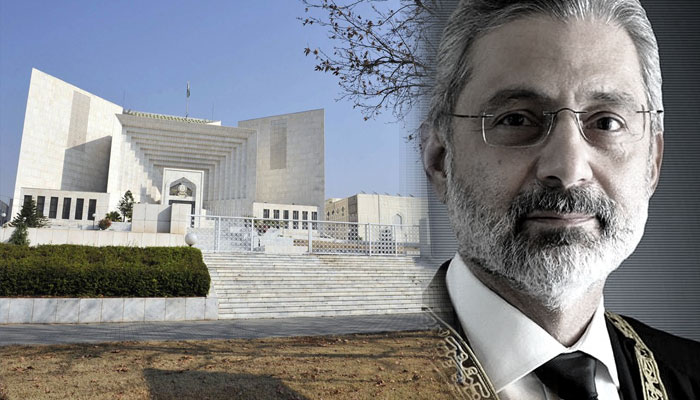Justice Faez Isa case: Judges accountable, not above law, says SC
ISLAMABAD: The Supreme Court Friday observed that superior court judges were not above the law and were more accountable than anyone, but they should be treated in accordance with the law.
A 10-member full court, headed by Justice Umar Ata Bandial, resumed hearing on a set of petitions challenging the presidential reference filed against Justice Qazi Faez Isa for allegedly not disclosing his foreign properties in his wealth returns.
The other members of the bench included Justice Maqbool Baqir, Justice Manzoor Ahmed Malik, Justice Faisal Arab, Justice Mazhar Alam Khan Miankhel, Justice Sajjad Ali Shah, and Justice Syed Mansoor Ali Shah.
The court again asked the federation’s counsel to answer the questions raised by the petitioner judge about malice as well as covert surveillance and abstain from unnecessary arguments.
Justice Maqbool Baqir clarified that the Supreme Court had never said that the superior court judges were above the law adding that judges were more accountable than anyone else but they should be dealt with in accordance with the law.
The judge said it was a wrong impression that a judge could not be held accountable adding that judges were answerable but they should be treated in accordance with the law.
“Today I am conveying on behalf of brother judges that we are not above the law, but we should be treated in accordance with the law as well”, Justice Maqbool Baqir remarked. Justice Mansoor Ali Shah asked the federation counsel whether women as citizen of the country had no rights and whether they could not acquire separate properties.
“How this jump was made that if a husband is a judge of the Supreme Court then he will be required to disclose the properties of his spouse?” Justice Mansoor Ali Shah asked Farogh Naseem. He further asked whether a husband could not get the pension of his judge spouse.
Farogh Naseem, however, reiterated that as there were disciplinary proceedings in the Supreme Judicial Council against the petitioner judge, he was required to answer about his spouse’s properties. He further contended that there were no proceedings of tax matter before the Supreme Judicial Council.
He further submitted that apart from other maters raised in the reference, the point of money trail had also been raised. Justice Maqbool Baqir, however, told the federation counsel that when he will be able to establish that the instant London properties were purchased from the income of the petitioner’s judge, then the question of money trail would arise.
Justice Umar Ata Bandial observed that the prime question was that as to how a judge was answerable for the act of his spouse.
Justice Maqbool Baqir observed that there were educated women, who were financially independent adding that often financially independent women do not know about the second marriage of their husbands.
The remarks of Justice Baqir drew laughter in the courtroom at which Justice Bandial immediately made it clear that he said it on a lighter note.
Meanwhile, Farogh Naseem submitted before the court that he would argue on the point of malice, covert surveillance as well as collection of material, evidence by the Assets Recovery Unit (ARU) on the nest date of hearing at which the court adjourned the hearing until Monday, June 15.
-
 Pal Reveals Prince William’s ‘disorienting’ Turmoil Over Kate’s Cancer: ‘You Saw In His Eyes & The Way He Held Himself’
Pal Reveals Prince William’s ‘disorienting’ Turmoil Over Kate’s Cancer: ‘You Saw In His Eyes & The Way He Held Himself’ -
 Poll Reveals Majority Of Americans' Views On Bad Bunny
Poll Reveals Majority Of Americans' Views On Bad Bunny -
 Wiz Khalifa Thanks Aimee Aguilar For 'supporting Though Worst' After Dad's Death
Wiz Khalifa Thanks Aimee Aguilar For 'supporting Though Worst' After Dad's Death -
 Man Convicted After DNA Links Him To 20-year-old Rape Case
Man Convicted After DNA Links Him To 20-year-old Rape Case -
 Royal Expert Shares Update In Kate Middleton's Relationship With Princess Eugenie, Beatrice
Royal Expert Shares Update In Kate Middleton's Relationship With Princess Eugenie, Beatrice -
 Andrew Mountbatten-Windsor’s Leaves King Charles With No Choice: ‘Its’ Not Business As Usual’
Andrew Mountbatten-Windsor’s Leaves King Charles With No Choice: ‘Its’ Not Business As Usual’ -
 Dua Lipa Wishes Her 'always And Forever' Callum Turner Happy Birthday
Dua Lipa Wishes Her 'always And Forever' Callum Turner Happy Birthday -
 Police Dressed As Money Heist, Captain America Raid Mobile Theft At Carnival
Police Dressed As Money Heist, Captain America Raid Mobile Theft At Carnival -
 Winter Olympics 2026: Top Contenders Poised To Win Gold In Women’s Figure Skating
Winter Olympics 2026: Top Contenders Poised To Win Gold In Women’s Figure Skating -
 Inside The Moment King Charles Put Prince William In His Place For Speaking Against Andrew
Inside The Moment King Charles Put Prince William In His Place For Speaking Against Andrew -
 Will AI Take Your Job After Graduation? Here’s What Research Really Says
Will AI Take Your Job After Graduation? Here’s What Research Really Says -
 California Cop Accused Of Using Bogus 911 Calls To Reach Ex-partner
California Cop Accused Of Using Bogus 911 Calls To Reach Ex-partner -
 AI Film School Trains Hollywood's Next Generation Of Filmmakers
AI Film School Trains Hollywood's Next Generation Of Filmmakers -
 Royal Expert Claims Meghan Markle Is 'running Out Of Friends'
Royal Expert Claims Meghan Markle Is 'running Out Of Friends' -
 Bruno Mars' Valentine's Day Surprise Labelled 'classy Promo Move'
Bruno Mars' Valentine's Day Surprise Labelled 'classy Promo Move' -
 Ed Sheeran Shares His Trick Of Turning Bad Memories Into Happy Ones
Ed Sheeran Shares His Trick Of Turning Bad Memories Into Happy Ones




